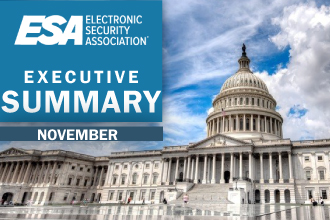Prefiling began for some states and other legislatures continued with their regular activity in a post-election month. Notable bills to appear in this report included the following: Prefiling began for some states and other legislatures continued with their regular activity in a post-election month. Notable bills to appear in this report included the following:
Illinois SB 3646 creates an occupational licensing board reform policy that follows the "least restrictive" regulatory framework seen in numerous other states. This bill also includes mechanisms that provide for a pre-determination of disqualification for individuals who wish to seek an occupational license but are unsure if their criminal background is disqualifying.
Michigan HB 5828 creates a school security commission that will be charged with creating school safety measures and metrics that must address at least the following:
School building layouts.
School building proximity to law enforcement agencies.
Emergency planning strategies.
Employment of school resource officers or other individuals authorized by law to provide safety in school buildings.
Surveillance technology.
Threat reporting systems.
Remote door locks
The bill provides for grants to schools administered by the Department of State Police with funds collected by the State Treasurer, but no amounts articulated. This bill passed the House on May 8, 2018 and was assigned to the Senate Education Committee on May 10, 2018. It was reported favorably with a substitute on November 28, 2018 and referred to the Committee of the Whole in the Senate.
Michigan HB 5955 and several related bills (HB 5956-5965) create the Local Government Occupational Licensing Act. It was filed in with the other bills to amend local subdivisions statutes and states that "If an occupation is subject to licensing requirements imposed by the department of licensing and regulatory affairs or any other licensing authority of this state, a political subdivision of this state shall not impose any regulations on that occupation that add additional licensing requirements to those already imposed by the licensing authority of this state." These bills passed the House on June 12, 2018 and referred to the Senate Committee on Michigan Competitiveness. On November 29, 2018 it was reported favorably from committee and referred to Committee of the Whole with a Substitute.
Montana SB 6 was introduced on November 19 and will allow school districts to utilize proceeds from several sources to be used for improvements to school safety and security.
New Jersey AB 4713 was introduced on November 26, 2018 and would require the installation of an automatic fire sprinkler system in new townhouses during construction.
New Jersey AB 4720 requires professional and occupational boards to issue a license, certificate, or certification to any applicant who received a license and equivalent training, education, or experience while serving or after serving as a member of the Armed Forces of the United States. The person applying for the license, certificate, or certification could have obtained a license and training, education, or experience during or outside of the person’s military service. The bill also requires a professional and occupational board to issue a license, certificate, or certification to an applicant who presents evidence to the board that: (1) the applicant was honorably discharged from active military service; (2) the applicant’s license, certificate, or certification is in good standing in another jurisdiction; and (3) the applicant complies with all other requirements for licensure, including a requirement for examination. This bill was introduced on November 26, 2018.
Nevada SB 11 adds cities located within counties that have a population of 700,000 or more to the exemption from regulations of the State Fire Marshal and it alters adoption requirements for counties and cities that must meet the IFC and IBC standards to three (3) years after publication of the most recent edition.
Texas HB 101 was filed on November 11, 2018 and it creates a criminal offense to use false or misleading caller identification information with intent to defraud, harass or cause harm to another person.




